Bonjour Tristesse Blu-ray Movie
HomeBonjour Tristesse Blu-ray Movie 
Limited Edition to 3000 - SOLD OUTTwilight Time | 1958 | 94 min | Not rated | Nov 13, 2012
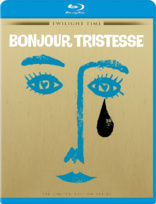
Movie rating
7 | / 10 |
Blu-ray rating
| Users | 3.5 | |
| Reviewer | 3.5 | |
| Overall | 3.5 |
Overview
Bonjour Tristesse (1958)
Cecile is a decadent young girl who lives with her rich playboy father Raymond. When Anne, Raymond's old love interest, comes to Raymond's villa, Cecile is afraid for her way of life.
Starring: Deborah Kerr, David Niven, Jean Seberg, Mylène Demongeot, Geoffrey HorneDirector: Otto Preminger
| Drama | 100% |
Specifications
Video
Video codec: MPEG-4 AVC
Video resolution: 1080p
Aspect ratio: 2.35:1
Original aspect ratio: 2.35:1
Audio
English: DTS-HD Master Audio Mono (48kHz, 24-bit)
Music: DTS-HD Master Audio 2.0 (48kHz, 24-bit)
Subtitles
English SDH
Discs
25GB Blu-ray Disc
Single disc (1 BD)
Playback
Region free
Review
Rating summary
| Movie | 3.0 | |
| Video | 4.5 | |
| Audio | 4.0 | |
| Extras | 2.0 | |
| Overall | 3.5 |
Bonjour Tristesse Blu-ray Movie Review
Au revoir, functional family.
Reviewed by Jeffrey Kauffman November 5, 2012Suddenly Alfred Hitchcock’s fascination with cool blonde women has become all the rage. HBO’s The Girl traced Hitch’s quasi-masochistic relationship with Tippi Hedren and the new theatrical outing Hitchcock deals (at least tangentially) with Hitch’s somewhat more “normal” interactions with Janet Leigh during the filming of Psycho. But there was another iconic director who had his own flirtation with obsession with a blonde actress. It may not have been as long of an obsession as Hitch’s evidently was (which, let’s face it, went on for decades and focused on any number of actresses), and it may not have spilled into this director’s personal life the way that Hitch’s did, but it is still an object lesson in a director perhaps listening more to his heart (or some other organ) than his head. Otto Preminger “discovered” Jean Seberg during a hugely publicized event to cast the leading role in Preminger’s film of George Bernard Shaw’s Saint Joan. Seberg’s performance in that film was roundly disparaged and perhaps set the actress off on a course of bouts with depression that would ultimately at least contribute to her suicide some years later. But Preminger wasn’t about to be swayed by any mere critics’ comments (and frankly who can blame him?), and immediately cast Seberg again in a pivotal role in his follow up to Saint Joan, 1958’s Bonjour Tristesse. The critics were at least a little kinder to Seberg this time out, though it really wasn’t until she emigrated to France and appeared in Jean-Luc Godard’s Breathless (À Bout de Souffle) that she was finally recognized to be more than just another (extremely) pretty face. Looking back on Seberg’s early work now, I for one think the critical analyses should be reversed. Her naïve and awkward approach as Joan of Arc seems rather well suited to the role of a young peasant girl who suddenly finds herself to be a sort of female Messiah, while her overarch (and way over-enunciated) take as a spoiled teenager in Bonjour Tristesse often comes off as extremely mannered and unnatural. Preminger no doubt probably still couldn’t care less what I or anyone thinks, despite the fact that the director shuffled off this mortal coil some time ago.
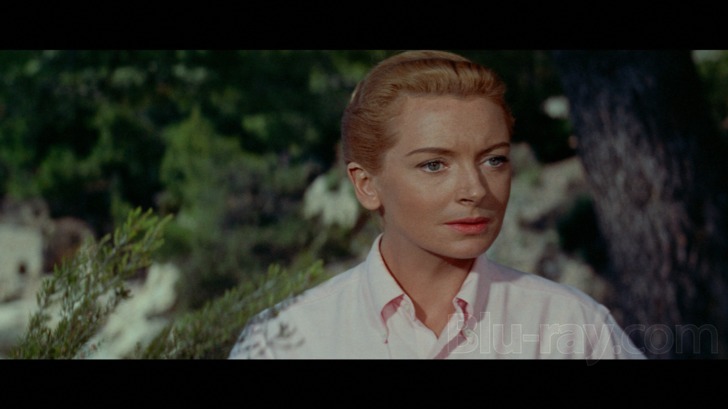
Françoise Sagan became an international celebrity when she was still a teenager and her first novel Bonjour Tristesse took the world by storm, selling several million copies and making her the toast of several towns. Sagan tended to write about disaffected European youth—think Rebel Without a Cause, only with a lot more money and better vocabularies, and that’s certainly the case with Bonjour Tristesse, a reminiscence of sorts by Cécile, played in the film version by Jean Seberg. Cécile is a spoiled and pampered young teen who lives with her cad of a father, Raymond (David Niven), an inveterate playboy who drifts from meaningless affair to meaningless affair, with Cécile watching, disaffected, from the sidelines.
Things change dramatically when Anne (Deborah Kerr) shows up at the family’s gorgeous French Riviera estate one sunny day. Anne had been a friend of Cécile’s late mother and her arrival, which was precipitated by a probably “just being polite” invitation from Raymond, seems to shock—albeit momentarily—him into some semblance of decency. Anne is intelligent, refined, a lady, and even Cécile seems to realize there’s something more in life than just being a kept floozy. However, once Raymond leaves Else (Mylène Demongeot), his girlfriend of the moment, for a more substantial relationship with Anne, Cécile suddenly finds her entire lifestyle and worldview being threatened, and she sets out to break the two up, with disastrous results.
There’s a Freudian subtext (some might argue text) to Bonjour Tristesse that is perfectly in keeping with the equally Freudian concept of a director being obsessed with a young blonde. In the case of the film, it’s the obviously unhealthy relationship between Cécile and Raymond, one that borders on a sort of platonic incest, if such a thing is possible. The two are almost like old lovers who have forsaken physical intimacy but are intertwined in every other conceivable way. Preminger attempts to sugarcoat this disturbing fact with luscious photography (this is in many ways his most beautiful looking film), but there’s a moral decrepitude at the heart of Bonjour Tristesse that eats away at its very dramatic soul, making the result unsettling and distasteful.
Preminger obviously believed (for better or worse) in Seberg, and truth be told, she does reasonably well in a difficult role here. The major problem is her affected speech, especially in her voiceovers (the film utilizes a sort of Strange Interlude conceit where Cécile will say one thing to a character on screen and then we get her real thoughts via narration). Her weirdly crisp pronunciations (listen to those “t”’s!) are simply too floridly theatrical and completely at odds with the supposed intimate character of the film. Much, much better are Niven and Kerr, both of whom would receive Oscar nominations that year for Separate Tables, with Niven winning Best Actor. Kerr in fact is near perfection as Anne, especially in the climactic scene (where Seberg also does incredibly well). For this sequence alone Bonjour Tristesse is probably worth checking out. It’s a stunningly staged and filmed moment and it offers some unvarnished and devastating emoting from Kerr that is hard to forget.
Scenarist Arthur Laurents seemed to have an easier time with it as a playwright and musical book writer (he wrote the books for two of the most iconic musicals of all time, West Side Story and Gypsy) than he ever did as a screenplay author, and his attempt to make some of the more objectionable elements of Sagan’s novel into a mainstream “entertainment” leave the film teetering precariously between melodrama and, frankly, camp at times. That is at least partially overcome by Preminger’s wise decision to shoot a lot of this film on location. The sheer sensuousness of cinematographer’s Georges Périnal’s work is visceral, though Preminger’s perhaps too arty decision to shoot the “contemporary” Parisian bookends in black and white and the main flashback in color plays too much like a turgid reboot of The Wizard of Oz’s similar conceit.
Bonjour Tristesse has built up a rather formidable cult following through the years, and in fact one of the pull quotes Twilight Time has included on the insert lauds the film as “arguably Preminger’s masterpiece”. I think any reasonable person offering an overview of Preminger’s career which includes Anatomy of a Murder or Laura would have a fairly easy time winning that argument, but when thrust up against the camp-tastic Otto Preminger Collection also coming out this same week, maybe it is time to reassess Bonjour Tristesse. At the very least that final climactic moment in the woods between Cécile and Anne is a showstopper that certainly ranks among the best things Preminger ever did.
Bonjour Tristesse Blu-ray Movie, Video Quality 
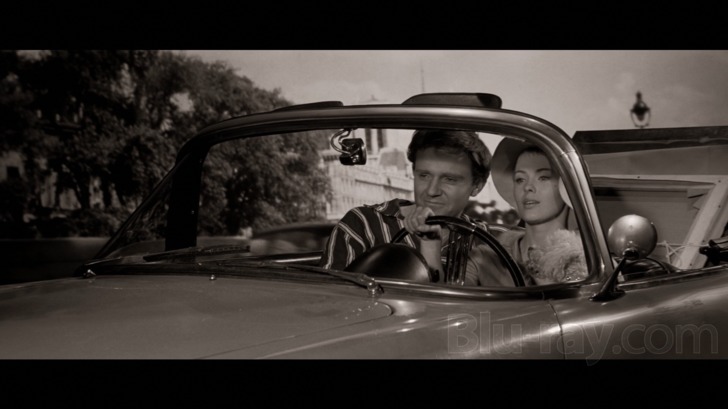
Bonjour Tristesse is presented on Blu-ray courtesy of Twilight Time with an AVC encoded 1080p transfer in 2.35:1. Once again Sony – Columbia has provided Twilight Time with an absolutely gorgeous looking high definition master. The black and white bookend segments offer solid contrast and excellent gradated gray scale, but it's the incredible color sequences (by far the bulk of the film) where this presentation really shines. Colors are absolutely stunningly saturated and robust. The blues of the French Riviera seas must be seen to be believed, and the radiantly sunny ambience (so at odds with the actual emotional tenor of the film) ripples through the frame with brilliance and vigor. Fine detail is excellent and the transfer retains a wonderfully natural appearance, with good grain structure and no overtly obvious signs of digital tweaking. The elements are in mostly spectacular condition, though eagle eyed viewers will notice one or two very slight blemishes along the way.
Bonjour Tristesse Blu-ray Movie, Audio Quality 
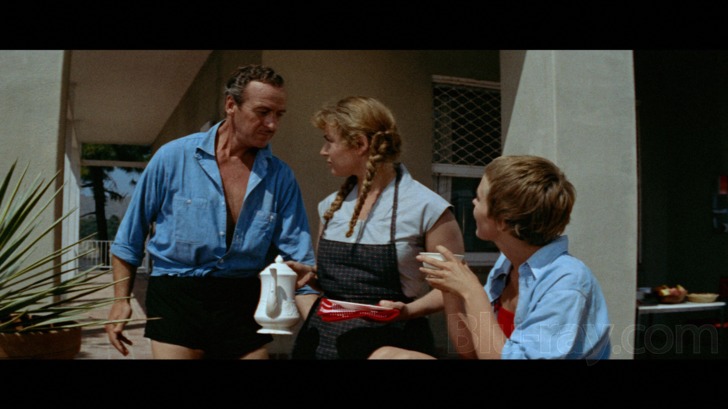
Bonjour Tristesse features a lossless DTS-HD Master Audio Mono track that suffices very well for this pretty talky film. Dialogue is well presented, though you'll hear noticeable differences in ambient reverb between the actual dialogue and Seberg's voiceover. While Auric's score sounds just fine on this mono track, switching over to the isolated DTS-HD Master Audio 2.0 mix really provides a fuller and more satisfying sonic experience, with noticeably boosted mid- and low range.
Bonjour Tristesse Blu-ray Movie, Special Features and Extras 
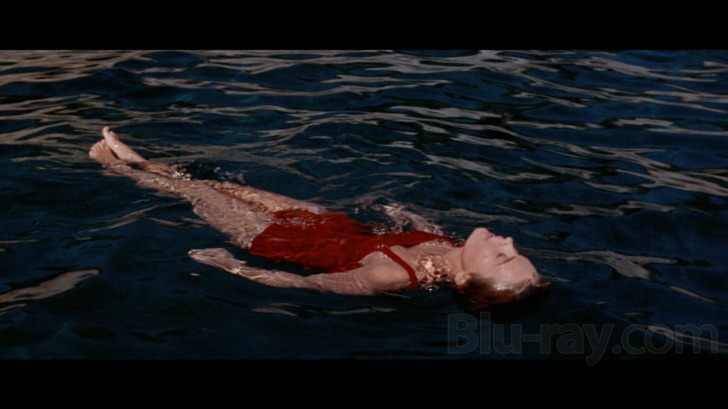
- Domestic Trailer with Françoise Sagan Interview (HD; 4:52) is an interesting piece which is also kind of funny. If you've ever seen supplements on other Blu-rays where stars have filmed "answers" to supposed questions that are then asked by local on-air personalities in an attempt to fool viewers into thinking an actual interview is taking place, you'll recognize that technique here, where Drew Pearson is ostensibly questioning the young author. What's even funnier is Sagan's relative inarticulateness, where Pearson will ask a long and involved question and she will either simply nod or answer in one word. Evidently she was better with the printed word than speaking.
- Isolated Score. Georges Auric's lovely score is presented via DTS-HD Master Audio 2.0, a presentation that significantly opens things up from its main soundtrack offering (the track also features sound effects, as is often the case with these Twilight Time outings). Auric burst upon the American market when Percy Faith adapted his main theme from the 1952 Moulin Rouge and made it into one of the bestselling records of that decade. Auric's Gallic sensibility is firmly on display here and the appropriately melancholy title tune, sung in a club early in the film, sounds great.
Bonjour Tristesse Blu-ray Movie, Overall Score and Recommendation 
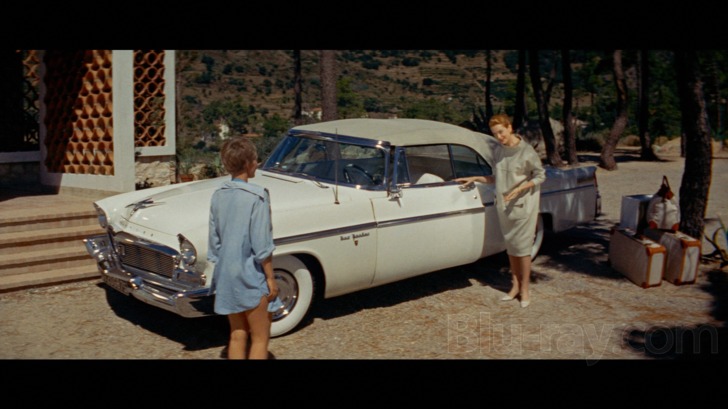
Bonjour Tristesse skirts with some fairly provocative ideas but perhaps because of the era in which it was filmed attempts to deal with them relatively circumspectly (which is rather odd, considering Preminger's long history of being intentionally provocative and pushing the "appropriate content" envelope). The film works in fits and starts, and that final scene with Kerr and Seberg is a real marvel, but getting there is awfully turgid at times. From a purely scenic standpoint, though, this is (to paraphrase a certain pull quote) arguably Preminger's masterpiece and this Blu-ray offers that scenery in truly stunning high definition. With caveats noted, Bonjour Tristesse comes Recommended.
Similar titles
Similar titles you might also like

Blancanieves
Snow White
2012

35 Shots of Rum
35 rhums
2008

Under the Sand
Sous le sable
2000

Rapture
Limited Edition to 3000 - SOLD OUT
1965

Sundays and Cybèle
Les dimanches de Ville d'Avray
1962

Young & Beautiful
Jeune et jolie / Slipcover in Original Pressing
2013

Sarah's Key
Elle s'appelait Sarah
2010

The Descendants
2011

Hotel du Nord
Hôtel du Nord
1938

Force Majeure
Turist
2014

Les Amants de Montparnasse
1958

Little White Lies
Les petits mouchoirs
2010

Pioneer
Pionér
2013

Her Smell
2018

I Lost My Body
J'ai perdu mon corps
2019

Children of Paradise
Les enfants du paradis
1945

Betty Blue
37°2 le matin | Director's Cut
1986

Bastards
Les Salauds / Slipcover in Original Pressing
2013

Jodorowsky's Dune
2013

Every Thing Will Be Fine
2015